A few links for today.
Bhutan has always held a certain fascination for me. I've been reading bits and pieces on it over the years and have mixed sentiments on whether the pros of seeing it would outweigh the cons of being an external pollutant. This link from the BBC today has some interesting little tidbits of info and a few nice photos.
Another wonderful post from Sara at firesinthehole keeps this blog up there as one of my favourites in terms of pure, rich prose. She's a poet amongst other things but I hope that one day she may write a novel. I would plagiarise horribly and horribly plagiarise her style if it wouldn't come over as awkward if I wrote it.
As you will have seen from some of the photos of the China tour, my mother was painting along the way. She's now put some of her paintings online, I may be biased but I really love these ones and I think that they give a better impression of the atmosphere than many of the photos ever can.
The plotline to this new S.L.Jackson film is cleverly hidden in the cryptic title. I hope to see this on the return journey from Munich to Beijing in August. I presume they spent too much money on scream sound effects to afford a less confusing title.
Lastly some physics, and why not? Professor Tim Hollowood from Swansea University has some notes online entitled 'cut-offs and the continuum limit: A Wilsonian approach to field theory'. I read this as a PhD student and found it one of the most elucidating approaches to renormalisation I've ever come across. Worth a read for anyone who's having trouble getting rid of those pesky infinities. This approach is not about performing loop integrals but about what the Wilsonian approach and renormalisation group really mean.
28 degrees so I'm not going to stand being stuck indoors much longer.
Sunday, April 30, 2006
Saturday, April 29, 2006
Muffled Brains Siesta Peacefully
Shoes are polished and ready to go
Saturday afternoon and I'm in the office. In fact, today everyone is in the office. We have a national holiday starting on Monday for a week but in exchange we're expected to be in work over the weekend. Can't argue with that I guess!
Everyone else seems to be gently swimming through the corridors having polished off half a pint each at lunch. The legendary Chinese constitution is not to be overestimated. Though I sat at lunch surrounded almost entirely by Mandarin getting more and more freeflowing as the centilitres crept down, I was involved in a brief conversation about whether I wanted to join The Party. It took a little persuading to inform them that they shouldn't start sending off the forms just yet. Pretty soon all will be asleep and I shall be able to work in a blissful silence.
In the mean time as the giggles reverberate I shall post some minor distractions.
A friend of mine here just had a driving test, but driving lessons here are unlike those in the UK and as far as I can tell it's all a bit barmy. Lessons are held in driving schools in specially designed model roads where there aren't the distractions of pesky motorists. All lessons are held here until the exam...which is also held here. This is all reasonable as for a learner, Beijing roads would be a pretty scary place. Though in a comment after staying here my mother mentioned that the drivers were incredibly skillful, this doesn't detract from the fact that we saw six accidents in the first week (In fact strangely this is only one more than I've seen in my whole six months here).
So, in order to save the learner's poor nerves, they never see a real road until they pass the test. Then once they've proved that they can turn corners, reverse park and emergency stop in the quiet confines of a driving school, they are let out on the chaotic roads for the first time, on their own. For anyone who has seen Beijing roads, this is an utterly terrifying thought. The first part of this sequence makes sense; it would be ridiculous to head straight into a Beijing rush hour the first time you get behind the wheel but to never see a real road until you pass says something deep about the priorities of safety out here. Curiouser and curiouser.
So, second book of the holiday was Kundera's 'The Joke'. His first novel and as I mentioned when I started it he had a great deal of trouble getting it published in a satisfactory translation
from within the confines of his occupied Czechoslovakia. It's a strange book and a lot of the structure of his later writing is there in a somewhat more clumsy but simultaneously raw form. The multiple stories which inevitably link, the themes of Czech politics and folk history and the sexual tension (often brewing to tempestuous frustration) are all there. He starts with several disconnected stories jumping backwards and forwards in time making a web of links which are only filled in late in the book. The individual stories are interesting but the vital links are left till the last minute. This means that they have an impact when you see them but at the same time the ends feel like they've been dangling freely for rather too long by this point. Still remarkable as a first novel and an interesting read but without the ingeniousness (often self-conscious) that he used later in his writing.
Dr Dan the mathematical neuroscientist has headed back to Canada after a big night out on Thursday. Depending on whether the authorities suspect that his fever is bird flu or not, he may be in a small room in Beijing airport being questioned about his poultry contact. Having mentioned that even as a string theorist my reading of scifi was pretty nonexistent I've been given an electronic pile of Phillip K Dick novels which I'm working through and will comment on when appropriate.
OK, all is quiet, I'll get on with some work...
Posted by
Unknown
at
8:26 am
0
comments
![]()
![]()
Thursday, April 27, 2006
With a Title Unknown
I have a spare hour! This doesn't happen much these days unless I'm stuck somewhere dusty and highly populated. The evenings are currently filled with saying goodbye to old friends, saying goodbye to new friends and meeting a whole slew of new and interesting folk from all over the place. The days are steady and full at work too with this GUT project hopefully about to start properly. I'm slowly working my way through past results and asymptotically creeping towards the expected answers.
Today we had a very interesting lecture. This one should be in double italics as there are bits that I'm still to get my head around. So skip this if you're not versed in string theory.
The lecture was on the subject of D-branes, what they really mean and how we can generalise the formalism we have at the moment. The point being that through the many duality relations a descriptions of a fundamental string and a D-brane are in many ways equivalent. If we understand one, we can understand the other and D-branes are just as good a place to start as any.
The lecture was based on this paper which is semi-readable from my point of view having just relearned some of the topology that sinks into the abyss so quickly as I never actually get to use it.
The essence of the talk was that we have a description of D-branes in terms of a boundary conformal field theory, the open string description where the various dimensions in which the string ends live are given Dirichlet or Neumann boundary conditions. This description can be given in terms of the connection two form F living on the brane. However, what Dr Zheng wanted to point out was that the possible boundary conditions we have coming from this description are overly constrained and there should be many other classes of solution not given by this particular description. D-branes have several topological constraints, one of which is given by the cohomology class of the pullback of the flux, H, on the brane.
There's a second seemingly equivalent description of the geometry of the branes in terms of a certain orthogonal group (related to the pullback of the (1,1) forms onto the manifold), the significance of which I'm not clear on yet.
The important point is however that using this description instead of the usual one there is more freedom with which to define the brane, and branes embedded in sub manifolds of higher dimension branes are easily described in this formalism.
Conclusion: Using a mathematically different description of D-branes working from the boundary conditions up we can find new objects which are well defined in string theory and are not subject to the normal flux constraints of your average D-brane. OK, I stop because that's past the end of my understanding on this subject. In fact I don't know how rigorous any of this is, not having a good enough feel for things like De Rham Cohomologies. Fun nonetheless and nice to sit through a lecture where at least I understood all the words.
So, OK, no more physics/D-brane philosophy in this post.
Gastronomically speaking today I've overcome my food nemesis which has sat with me for the last decade. The only thing (as far as I remember) which I have failed to eat on squeemishness grounds was a conch. It arrived on my plate somewhere in the depths of a drizzly Normandy evening, cold, slimy and tasteless and I felt like Charlie Chaplin attempting to eat the rubber of his boots. However, the shoe was on the other foot today and I enjoyed a fine meal of spicy, well heated, thinly sliced conch which was a treat to behold.
On the literary front, there are many books still to talk about but for now I'll return to a favourite which I had the pleasure of reading whilst on holiday. 'To a God Unknown' was again an early Steinbeck but one which he slaved over for many years and is far more finely polished and honed than Tortilla flat, written at a similar time. The book chopped and changed so much (including the title shifting emphasis from 'To an unknown God' to 'To a God Unknown') that some of the original characters ended up in his book of short stories 'The Pastures of Heaven' - also a great read. 'To a God Unknown' is about a man who leaves his ancestral home to set up anew on fresh land with a renewed energy and enthusiasm. He picks his spot under a tree which he believes looks over the land as a God over his people and all safety and advice are drawn from the tree. The rest of the family come to settle on the land and in the course of time as in all Steinbeck's stories there are births, marriages and deaths and parties, each somehow seeded with a bitter pill which may or may not come to light through the book. The warmth from the tree turns to an unhealthy worship, frowned upon by many and it's no surprise that at a turning point in the book, things turn bad, the dry years arrive and the melancholy of his writing shows through just as powerfully as it did in his more mature work. I shan't give away the end, though generally the plot itself isn't the most important point about his books, the relationships and character traits are what give the relatively simple stories such depth. Another fine and satisfying read.
OK, I didn't quite have an hour and now time is almost up. I must make my ablution before heading out to a friend's leaving do.
Posted by
Unknown
at
12:51 pm
4
comments
![]()
![]()
Wednesday, April 26, 2006
OK, so the final diary entry for the big trip now, I promise. We were just drawing to the end of the Shanghai stay heading onto the final destination.
-----
Though trains are the transport of choice for most of the traveling Chinese population it was only at this point in my stay here that I took my maiden voyage. This was the mid morning Shanghai to Hangzhou train and was our first real view of the density of people in the big cities. Upwards of 4000 people sat in one of the many departure lounges and jabbered loudly, sitting wherever there was an inch of space to occupy. At the appointed time, 1000 people rose and went through the small departure gate in remarkably unriotous fashion. All 1000 people were through the gate and seated on the train within five minutes and shortly after this the train pulled away. I've been reading and speaking to people about ridiculous train journeys where they've had to stand up for two days or been sat on a hard seat for 72 hours (Chengdu to Urumqi in the 90s) but our journey I'm afraid was not nearly as exciting. Extremely comfortable, reasonable leg room, a constant supply of beer and pot noodle on offer and onboard TVs rather put Mr Branson to shame. At some point in the next few years however this same journey which for us took a little over two hours will take 20 minutes as a maglev is installed hurtling the businessfolk at 450 km/h across the East China countryside. It's some truly exorbitant cost but I guess this means that big business goes on between the two cities and quick access is required.
We pulled into a grey and rainy Hangzhou, not yet showing us the beauty for which it is renowned. A half hour wait for taxis left us saturated and ravenous and the busy streets bustling with sleek cars together with cattle on flatbed trucks simply prolonged our foodless states. Eventually we pulled into the Hangzhou Shangri La, described as one of the grandest hotels in all of China (only an uncle in the travel business and not the heavy wallets wielded by many a guest made such a stay possible).
With some delays we lunched and spent the rest of the day staying out of the drizzle and enjoying the luxurious hotel facilities, the gym again balancing conscience versus calories temporarily while others soaked in the pool.
Having stayed in dirty hostels for the majority of my traveling experiences, to be in a bed so wide that I couldn't touch both sides looking over Hangzhou lake was not to be sniffed at.
I decided to have a day on my own the following morning in order to collect my thoughts and take my own pace to explore the famous West Lake and surrounding mountains, museums and temples. Unfortunately I've never been terribly good at regulating myself so after five hours of almost constant walking and another hour in the gym I'd managed to damage the tendons in my feet (due to my pancake-like soles).
During the 20km stroll I walked a good deal of the lake and foothills getting more stares than I've ever had anywhere in China. It's a very very popular tourist destination for Chinese tourists though in five hours of walking I only saw two other Westerners. Almost every group (of which there were many thousands that day) that I walked past would comment on my height (in Chinese) and giggle and gawp. Some took photos and some videos of this freak of nature! Often I would greet them in Chinese and agree with their comments on my height, which seemed to please them a lot.
The huge crowds for whom I was an object of fascination: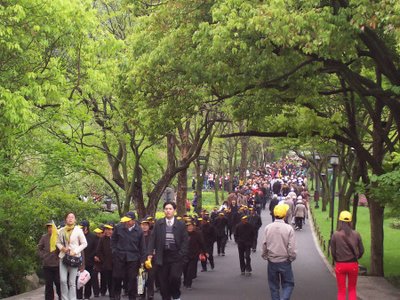
A couple of the views of the West Lake: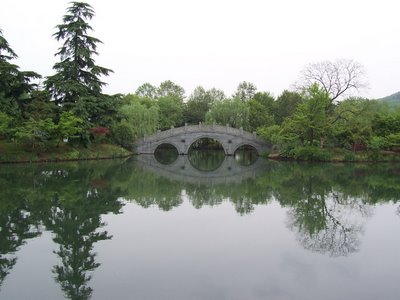
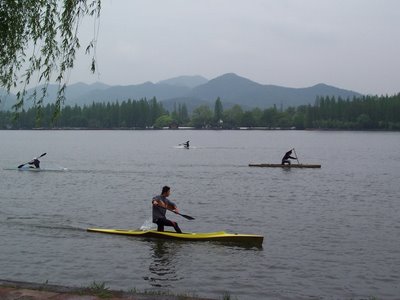
My first aim was to get to the national tea museum which is set in the tea plantations between the lake and the mountains and is complete with its own tea institute. The museum charts the 3000 years of tea history from its beginnings as a curative for a medicine man who would get poisoned 72 times a day testing herbal concoctions to the 20th century revolution in tea studies in modern day China. In the maze of buildings and outhouses I missed the tasting room though had a fine cuppa with a quick lunch.
Tea pickers picking tea: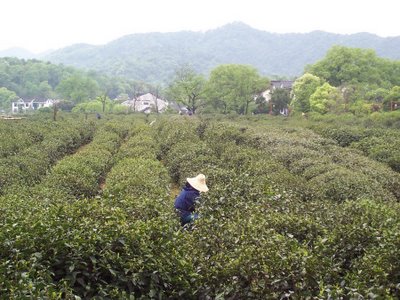
and one of the tea gardens in the area:
After this I walked round a good deal of the lake that I'd missed before, getting some snaps of my own and popping into some of the temples along the way.
Another window shot from one of the mini-museums: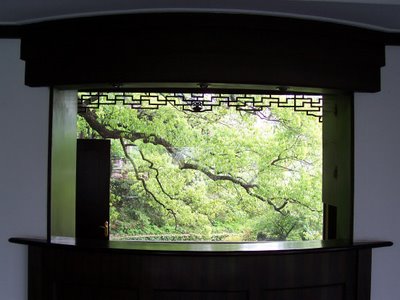
Rejoining the others for dinner we tried two of Hangzhou's celebrated dishes, vinegared grass carp and mud baked chicken, both of which are superb and definitely worth sampling if you're in the area.
The final day (day 11) and we went en famille to the traditional Chinese medicine museum which is in a stunning 400 year old traditional pharmacy and though the displays are interesting there's not a great deal in the way of information about properties of the multitude of concoctions. The pharmacy joining the museum had everything from dried seahorses and frogs to fungal monstrosities and single roots of ginseng for 20,000 pounds a pop!
So, the final group meal on one of the lake's islands complete with complementary looks of confusion and it was time to bid farewell to my four traveling companions who'd been wonderful company. Prior to the trip I'd been slightly apprehensive at how the dynamic of the group would work but it turned into a superb couple of weeks of sightseeing and chatting over fine food in fascinating locations. I now look forward to my next exoBeijing excursion wherever that may take me.
----------
[Writing in Hangzhou airport]
As my flight is delayed further and further I hope that the trip has given the braincells some time to recuperate and reorganise into a pattern which will be conducive to getting back into the research life.
---------
Braincell update - braincells rearranged nicely though dimming steadily once more.
So, there it is - JMTA is complete and with that I shall once again head to bed having just had a two hour Chinese lesson making both my voice and eyes a little jaded.
Posted by
Unknown
at
2:18 pm
0
comments
![]()
![]()
Lazy blogging at its best. I bring to you from mpanther's site the following report detailing why when I said that it was somewhat dusty in Beijing, I wasn't exaggerating.
China trying to rain on dust storm's parade
BEIJING, China (AP) -- Beijing will try to use artificial rainmaking to clear the air after a choking dust storm coated China's capital and beyond with yellow grit, prompting a health warning to keep children indoors, state media said Tuesday.
The huge storm blew dust far beyond China's borders, blanketing South Korea and reaching Tokyo.
The storm, reportedly the worst in at least five years, hit Beijing overnight Sunday, turning the sky yellow and forcing residents to dust off and hose down cars and buildings.
Hospitals reported a jump in cases of breathing problems, state television said.
The government was preparing to seed clouds to make rain to clear the air, state TV said, citing the Central Meteorological Bureau. It did not elaborate, and the bureau refused to release more information.
Storms carrying chalky dust from the north China plain hit Beijing every spring, but newspapers said this week's was the heaviest since at least 2001. The Beijing Daily Messenger said 300,000 tons of sand and dust were dumped on the city Monday.
That was "definitely one of the most serious pollution days in Beijing," weather forecaster Yang Keming said, according to the China Daily newspaper. "Small children had better stay at home during such days."
The dust reached Tokyo on Tuesday, the first time that has happened in six years, said Naoko Takashina of Japan's Meteorological Agency. Dust from China was found in more than 50 locations throughout the country, she said.
The Japanese agency warned of reduced visibility but did not say any health dangers were expected.
In South Korea, a light layer of dust blanketed the country, but no ill effects were reported. Rain was forecast overnight Tuesday, and the weather bureau said it should clear the air.
The dust storms are expected to last through at least Wednesday in Beijing, neighboring Tianjin and a swath of north China stretching from Jilin province in the northeast through Inner Mongolia to Xinjiang in the desert northwest, the China Daily and other media said.
That region is home to hundreds of millions of people.
More storms were expected later in the week in Xinjiang and other parts of the northwest, according to news reports.
China's government has been replanting "green belts" of trees throughout the north in an effort to trap the dust after decades when the storms worsened amid heavy tree-cutting.
Last week, the western Xinjiang region was hit by its worst sandstorm in decades, which killed one person and left thousands stranded after sand covered railways and high winds smashed train and car windows.
Not a lot of fun! Will be back later for less lazy writing I hope.
Posted by
Unknown
at
11:03 am
2
comments
![]()
![]()
Tuesday, April 25, 2006
As we draw towards another holiday things are getting hectic again before they calm down. A great weekend meeting new people was followed yesterday by my first attempt at running an English speaking group, which, from my point of view went surprisingly well.
I didn't want to patronise but at the same time I was aware that by aiming too high and getting them to do things that they were uncomfortable with, the thing might crash before it had even got going so I prepared a few bits and pieces before the lesson.
We started with the usual introductions with a few twists by a getting each to tell me the most unusual things about where they come from. A real range of origins from the far west autonomous region where the Uiguir minority originate, to several from Szechuan and Hubei and a couple from the far East of the country. I also wanted them to tell me what their impressions of England were, not in order to trip them up but just to get them thinking. They had some unsurprising stereotypes with a few interesting things that I would never have thought of which they told me they had been taught when at school.
We talked about English food and a few authors and I got them to tell me all about their favourite dishes from China. The Chinese love to talk food!
I'd prepared a quiz for them about the UK which seemed to be the big hit of the day. It was more of an open discussion which was what the lessons are supposed to be about and it really got them to open up and chat freely. Their favourite was a round where I'd written several of the arcane laws of England which seem ridiculous today, and in with them I'd made up a few fake laws. They had to guess which was real and which made up. This also allowed me to introduce a few key parts of British life which will come in extremely handy in general conversation. For instance the whole class now knows about the Chelsea Pensioners and who Gordon Ramsey is (complete with smug photo - this was all done on the overhead).
I'd set up a slide show to run in the background when we were chatting in case conversation lulled (which it never seemed to) so that we could have something to talk about. However, having set this up on the computer and not had time to change it, I can say with almost 100% certainty that I'm the only physicist in Beijing who has pictures of the Queen, Radiohead, Big Ben and Old Trafford cycling through their screen saver. I'm still somewhat taken aback to see Tony Blair grinning at me whenever I look up from my books.
Anyway, a tiring but really enjoyable couple of hours which we will have every two weeks. The assignment for next time is to find an English poem to bring, read and discuss with the rest of the group, perhaps in smaller groups if there are too many people. Having read The Jabberwocky to them at the Spring Festival 'carnival' I may get them to dissect it!
----
I'm attempting to find a spare five minutes in which to write up the last few days of the trip but for now I will put some photos from the previous legs which I hadn't included before.
The sun poking through the Yangtze clouds.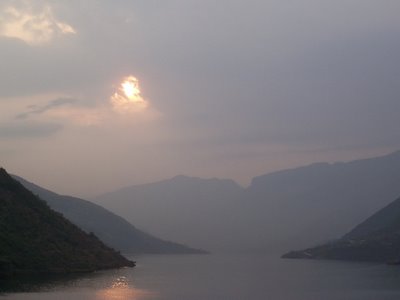 One of the Gods of the underworld, presumably the God of matzos.
One of the Gods of the underworld, presumably the God of matzos.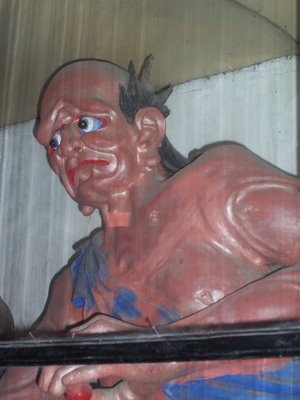 I mentioned previously that coffins hang precipitously in cliffs along the gorge, like this:
I mentioned previously that coffins hang precipitously in cliffs along the gorge, like this: As we were being rowed in the sampans, a chap waded into the water and jumped on board seemingly to hitch a ride. It soon became apparent that this was a particularly industrious postcard seller with a completely captive audience - ingenious indeed.
As we were being rowed in the sampans, a chap waded into the water and jumped on board seemingly to hitch a ride. It soon became apparent that this was a particularly industrious postcard seller with a completely captive audience - ingenious indeed.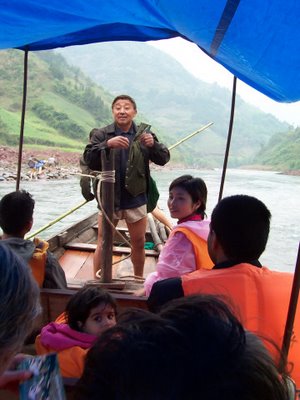
----
Speaking of language I spent a little over an hour in one of the most depressing places in Beijing on Sunday afternoon. Between two train lines at Xizhimen there is a stretch of 50 yards or so where you walk in the open to get from one to the other. In this space there are the usual touts selling Beijing 2008 trinkets, puppies confined in vile cages, tortoises attempting to run away and pineapple stands selling freshly cut glistening fruit covered in dust and grime. In this particular place there is also a high density of 'fa piao' women and their call is a chilling one which turns my mind to numb jelly. Fa piao are fake receipts that you can buy for a few kuai in order to show your boss that you've been out for an expensive lunch and claim the money back. It's a fairly representative sales object in a place like Beijing but it's the manner in which it's advertised which is so horribly disturbing (to me at any rate). Women from the countryside come into the city to sell these tickets. They're ruddy faced and slightly chubby and in their 40s or 50s. Around 20 of them stand in the 50 yards between the two station and have a continuous metronomic chant of 'fa piao' that is so automatic as to feel like you're walking past a line of androids. The words are not in the Mandarin neutral tone but some numb tone which makes the world go grey and any light in your eyes dim as you walk by them. I pass this place very regularly and I've never seen anyone buy a single ticket. Occasionally the police ride by and the chant stops momentarily but just as quickly the drone is turned on and the waves of colourless desperation hit you as you go about your business.
It's mainly because I was sat there for an hour reading my book that I was so struck by it this time. I'd hoped to find a cafe to sit in but wandered around without luck for half an hour as my eyes became sore with the pollutants and my face turned to dust as the Gobi swished around my head. I shan't be making that mistake again.
-----------
and now for something completely different...
My work at the moment is focusing on one particular GUT (theory which unifies the three forces of the Standard Model) though currently I'm just attempting to reproduce some previous results (essentially just some group theory) so that when I come to the new model I should be able to get answers quickly. I'm not sure what direction this is going though as currently the point of this model isn't a phenomenological one, it's more an aesthetics angle. This is all well and good but aesthetics should never take precedent over testable results. Just because a model looks nice, if you can't test it, it's not really science. I'm being particularly cynical here and I think that the point will be eventually to make testable predictions but first things first so now we just have to build it (mathematically speaking). In fact I'm essentially offering myself to this project as a calculation monkey in the hope that I can learn some new skills and get another publication while I'm at it - everybody wins!
Been a good day today in all and this morning started with four citations for my previous work, a record. It should have been a less than productive day as I finally managed to doze off to sleep at six this morning, however, somehow the brain has been ticking along and I've gone at least some way in the right direction. Right, enough, to sleep.
Posted by
Unknown
at
11:27 am
6
comments
![]()
![]()
Sunday, April 23, 2006
It's warming up nicely and my apartment no longer feels like an ice box. It is however still a lot cooler than outside which means that every time I step out of the door I'm bathed in the balmy, slightly breezy air which has settled over the city.
It's been a great weekend, meeting some new friends and finding a few new treats about the place.
During the week I met a Canadian guy in the local campus store. This is a pretty big deal as in the year that he's been here I'm the first Westerner he's ever seen in the shop. We got chatting and it turns out he's a postdoc mathematician working on control theory, specifically related to motor control in the human body. Really, really interesting stuff so we met up over the weekend to chat branes and brains over a few beers. I'll try and formulate my thoughts at some point on the details of his work and write it up on here.
He's been here for a year and has a lot of great hints and warnings about life in China. I generally end up at the expat bars so it was great to head to a far more local place to sit in the noisy, smoky atmosphere over some 15p beers and lamb kebabs. Next to us was a table of late 20s Chinese men drinking beer, eating snacks and generally getting pretty merry. It turned out that they are from the CAS campus too. Towards the end of the evening we got chatting and when I mentioned that I too was from the CAS they laughed and said that of course, they new that. I am it appears a famous face on the campus and I hope that my celebrity is simply a matter of being exceptionally tall and white. It's a strange feeling and though I get stared at every time I walk around the grounds I hadn't really taken on board that I was not only seen but noted.
Anyway, for now I must go meet up with friends for Sunday lunch at a local Muslim eatery but still to come is the last installment of the holiday and there are lots of physics things that I want to write about.
Posted by
Unknown
at
6:47 am
4
comments
![]()
![]()
Friday, April 21, 2006
New post from the holiday below but first a few random musings.
Whilst on holiday and since then, I've had a chance to gnaw my way through a reasonable stack of books, many of which I'll discuss in more detail when I'm finished with recounting the holiday itself. However, now that I'm back I'm reading a great book called River Town: Two years on the Yangtze, by an American author and now Beijing correspondent for the New Yorker, Peter Hessler.
In '96 as a Peace Corps volunteer Peter went to work as an English teacher in a city on the Yangtze where he was one of the first Westerners ever to live in the city. As a constant object of fascination, derision and general confusion for the locals he writes about the bewildering, eye-opening and touching experiences he has in the two years he lived there. It's a very well written account of what was clearly an infinitely bigger culture shock than coming to live in a relatively Westernised Beijing where, in the right places, white faces are far from unusual. The number of faux pas he makes are, I hope, far in excess of those I've been making, simply because the people that I work with are pretty used to Western ideas (even though I'm the first Westerner in the department) and I think they give me a pretty decent amount of breathing space when it comes to making blunders. Anyway, I highly recommend this as a great intro to mid 90s small city Chinese life and customs from the point of view of a struggling American.
Saying that, I did make a blunder a few days ago which has been intriguing. I bought back from my holiday a small present for a member of the department to thank them for allowing me the time away. I took this present to give to the person, chatted for a while and then offered the gift. They refused, saying that I should give it to someone else. I insisted that they take it and again, they said that it would be better going to another. I thought that I shouldn't push the matter any further so withdrew the gift, said goodbye and left, a little puzzled.
Chatting later with an Asian friend I mentioned what had happened and, in the politest possible terms, they told me that I'd done wrong and it was always custom to either accept a gift without saying anything at all or to refuse. Protocol dictates that if this is the case you insist forcefully until the gift is accepted.
I figured I could still cut my losses so returned later in the day and insisted that the gift be accepted which it was, first time. I don't feel embarrassed by this as (perhaps naively) as a well traveled person, I presume that they understood what my thoughts were and I wasn't being intentionally rude but I shall certainly know for next time that even if someone seems reticent to receive a gift, they onus is on the giver to make sure it's finally accepted.
Linking in somewhat with my Steinbeck obsession, in the epilogue to The Log from the Sea of Cortez, there's a section all about Ed Ricketts, Steinbeck's best friend and the character that Doc (Sweet Thursday, Cannary Row) is based on. Steinbeck says that one of the reason that Ed was such a popular guy was not his generosity but the fact that he accepted gifts with such skill. It was a pleasure for anyone to give any small present to him and this humble acceptance drew people to him and made them feel immediately that Ed felt warmly towards them. This, rather opposite attitude to the Chinese way of giving and receiving presents is an intriguing personality trait that I hadn't thought about before but makes a lot of sense.
OK, plug put in that line of thought, tap turned on on a new one:
As Chinese characters blur in and out of focus I come to a couple of strange conclusions...
As I was doing some Chinese practice last night I surprised myself as I was reading some text purely in pinyin, the Romanised form of the written language. When you write pinyin, the intonation is written as a series of angled strokes above the relevant letters. For instance, the word 'shi' with a / above the i can mean (along with many other things) the number ten, while 'shi' with a \ above the i can mean 'is'. In this case I remember the intonation for these simple words but many I struggle with finding that though I know the letters, the tones get jumbled as I trudge slowly from one word to the next. Reading in Pinyin last night I was getting confused between words which differ only in their tonality and the realisation that struck me was that I now find it easier to read Chinese characters fluently than I do reading pinyin. I wouldn't have expected that after just a few months but it's surprising how quickly one begins to adapt to the characters. The point is that I can read Chinese characters without knowing how to say the words in Chinese, they are simply a direct code to English.
My second conclusion goes completely against everything I've just said above. Last night was the first time I've studied pinyin for a while and in just half an hour of reading I'd already learnt and memorised seven or eight words. This just doesn't happen with the characters, which, though more firmly set in the memory once they've been thoroughly replicated on my many scraps of paper, simply need so much more time and effort than just learning the pinyin.
As my time here is limited I wonder whether I should do what most short term expats do here and concentrate more on building my vocabulary and confidence with speaking than learning how to read and write the language. Essentially my aim is to be able to have a reasonable conversation with someone in Chinese on a subject which is a little deeper than where we live, what we do, how old we are, etc. which is my current limit. I feel that this aim will be more reachable by concentrating (though not uniquely) on the speaking and putting the characters into a still important second place.
If I were having lessons every day I would without a doubt continue on the path I'm currently on but at one lesson a week (often disrupted by life in general) I feel I must prioritise.
Anyway, I have an English lesson to plan for Monday. They want to know about life in England so I've now prepared a slide show of pictures from the English countryside to city cathedrals and nights out on the town complete with drunken revelry. This may surprise a group of people for whom going to bars is an alien concept. I look forward to finding out!
P.S I am doing some work at the moment, really guv.
Posted by
Unknown
at
10:12 am
0
comments
![]()
![]()
Thursday, April 20, 2006
Part 4 -- Yi Cheng - Shanghai - Suzhou - Tong Li - Shanghai. Many amazing sites, lots of photos!
-------------
After disembarking from the boat (complete with farewell fanfare from the brass band) we drove through the small backwater of Yi Cheng, population 4 million, many of whom are working in some way on the dam project. There's a whole university in this city dedicated to dam studies! It's a dusty, industrial city and the few hours we spent waiting at the airport was a decent chance to rest (sitting around on a boat watching stunning scenery is remarkably hard work), complete with aviation fuel odours.
A delayed flight later and we landed in Shanghai, gloriously warm and humid. A short taxi ride to the hotel introduced me to a completely different side of China to anything I'd seen previously. Shanghai is closer to a cross between Tokyo and Paris than to Beijing and it's immediately obvious that this is the centre of big business. Even with the misty night, the lights of the skyscrapers peered through the fog giving a remarkable cityscape.
An enormous buffet in the hotel including frogs, river eel, octopus and crab left me with a distinct psychedelia of dreams.
In my first year at Southampton University, where I took my PhD, one of my flatmates was a Chinese girl, Sylvia, with whom I chatting and cooked (along with a good Greek friend) most evenings. Sylvia is Shanghainese and so as the others went off to explore the Bund, I was met by Sylvia and her driver and taken to a superb restaraunt.
It was lovely to catch up with Sylvia, meet her husband and her very bubbly ten month old baby boy. I was taken aback and honoured to be asked to give her son a Western name. Before seeing him I was rather worried about how I would choose a name but as soon as I saw him I knew that he was a Ben. Once the pronounciation was settled, everyone, including Ben seemed happy with the choice. Unfortunately I'd forgotten to bring the camera so pics will follow when sent from Sylivia.
Sans baby, we headed into the Shanghai drizzle to wander around Pudong where you get an excellent view of the Bund, Shanghai's most famous street of stunning buildings, and to enhance this we took a boat ride down the river. Again a lack of pictures but I can recommend this short trip to anyone in Shanghai with half an hour spare.
Due to prior arrangements we departed company after this short excursion and I headed back to the hotel to meet the parents. Though I was fine in Shanghai catching taxis as my Chinese is good enough for that and even for the occasional chat with a driver, Shanghainese is remarkably different from Mandarin. Though close in many ways to Mandarin the peculiarities in pronounciation, including swapping some consonants and tones makes it very hard to understand for a beginner like me.
From the other's ravings it sounded like I'd missed an exquisite collection of bronzes, ceramics and ethnic clothing in the Shanghai museum but I plan to head back to the city in the near future. Unaware that we would only be staying in Shanghai for a couple of days, with perfect Chinese hosptitality, Sylvia had arrange a house for me to stay in and a driver to see me around the city. It was with great regret that I had to turn down this amazing generosity.
The day concluded with Japanese lesson 101. My fellow travellers hadn't sampled a great deal of Japanese food so I did my best to offer a decent cross section from the extensive menu in the hotel. Two hours later and seemingly satisfied customers left the table replete with suitable combinations of sushi, sashimi, tempura, terryaki, wasabi and sake, to retire after cups of coffee and tea had topped off the meal.
Early starts were growing a little tiresome by this point but I was happy to continue knowing that there were only a few days left. An early meeting with a less than forthcoming tour guide and speed freak driver started our day trip to Suzhou, reknowned for its fantastic gardens and the grand canal, another ancient Chinese project of gargantuan proportions. Some 2000 years ago the Chinese built a 1700km canal between Beijing and Shanghai, the Chinese don't do things by halves! By this point, the immense figures (a million workers on this project - 2000 years ago!!!) trip off the tongue flippantly as we witness yet another astounding feat of ancient engineering. Incorrect information aside, Ming got us to all the spots we wanted to see, starting off with two of the gardens that Suzhou is world famous for. In fact this shot is surprisingly unstereotypically Chinese. The usual Chinese garden is more simple and understated but at this, the Garden of the Humble Administrator, all guns were blazing on the clash front.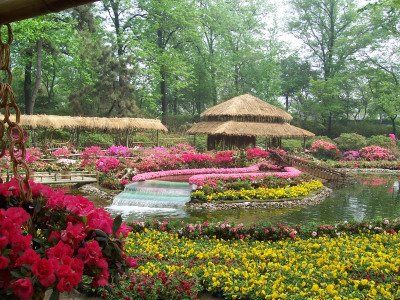
M performing his best Bond impression in one of the many moon gates.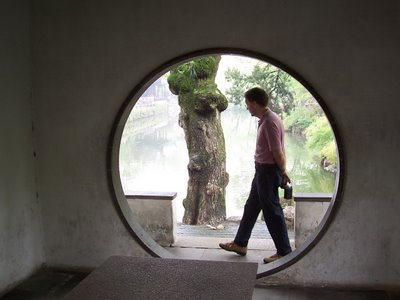
People love to pose for photos here and I managed to sneak a picture of this woman elegantly stood in an arch.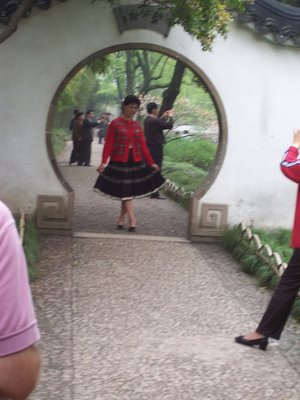
I loved this tree, not shaped like this on purpose but quite unmistakably (at least to my imagination) like a dancing man.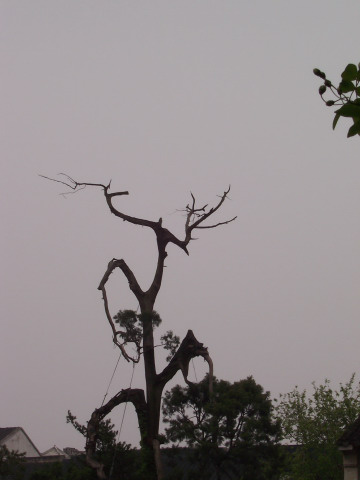
and this is one of may favourite shots through an ancient window at the bamboo set against the white walls.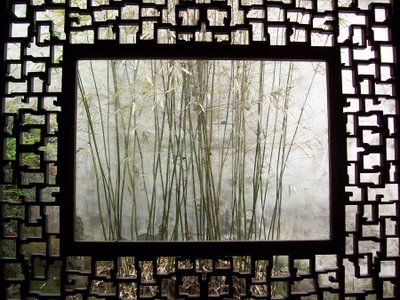
Back in the car we passed this biker who grinned from ear to ear as I took his photo.
We then went to the silk factory where the silk is provided by the 500,000 local silk worm farmers.
They show you the whole process of silk production from the worms themselves through the amazing process of extracting the threads from the crysalis and making the multifibred strands all the way to making silk garments and duvets.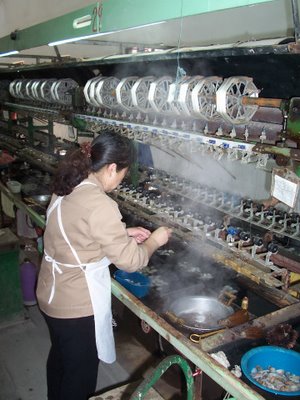
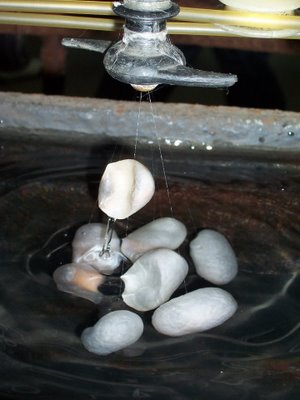
Then on to Tong Li, the Venice of the orient, complete with a stinky tofu stand on every corner. A stunning little town and I'm sure that a full day there would take you more off the tourist trail and into Tong Li proper where a couple of hours in a tea-house overlooking the canal would be a rather fine way to spend an afternoon.
Men sit by the side of the road in the afternoon haze waiting for nothing in particular.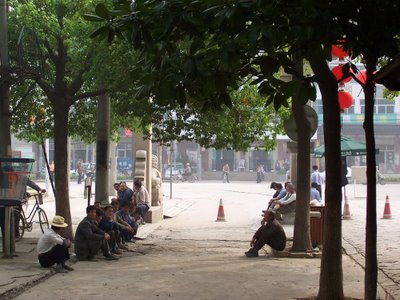 My party as they escaped the clutches of the local bank which held up my father and his passport for some time while he attempted to change travellers cheques. They had to run round the corner to find a photocopier in a local shop.
My party as they escaped the clutches of the local bank which held up my father and his passport for some time while he attempted to change travellers cheques. They had to run round the corner to find a photocopier in a local shop.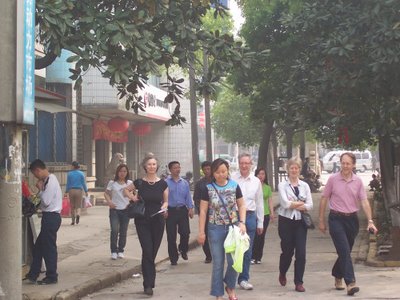 For a small fee you can be cycled around the city at your leasure though we opted for the pedestrian approach.
For a small fee you can be cycled around the city at your leasure though we opted for the pedestrian approach.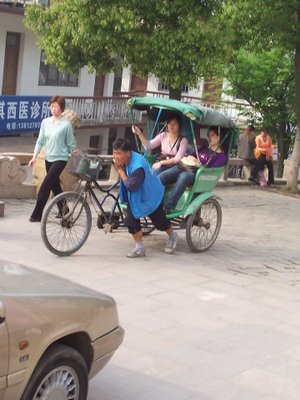
A woman and her child sit by the side of the river watching a comedy show on TV.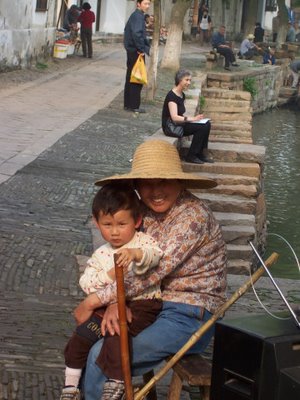 For a higher price you can be carried on a short tour by sedan, complete with tooting and fluting band making a racket and waking any afternoon dozers.
For a higher price you can be carried on a short tour by sedan, complete with tooting and fluting band making a racket and waking any afternoon dozers.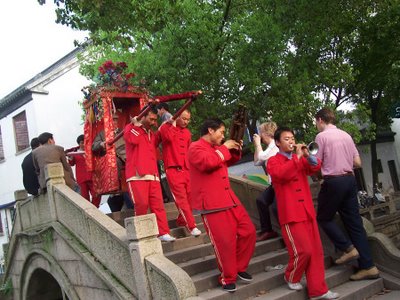 In one of the gardens there was this stunning maple tree with incredible colours.
In one of the gardens there was this stunning maple tree with incredible colours.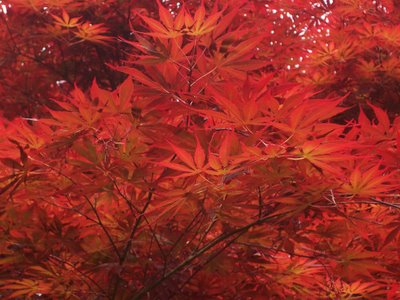 The canal itself
The canal itself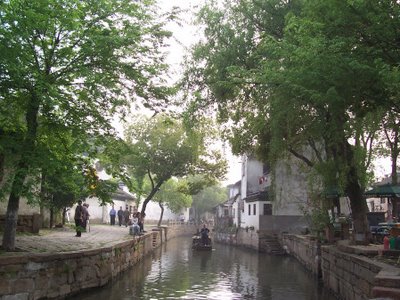 Men playing Mahjong by the side of the road.
Men playing Mahjong by the side of the road.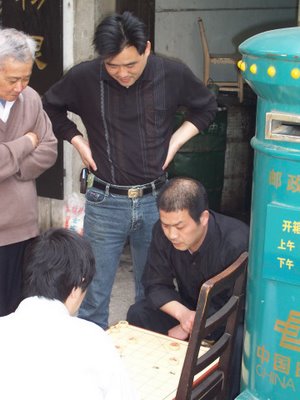 On the canal there is a woman who uses cormorants for fishing. The normal method is to tie a loop around the bird's neck so it can't swallow the fish. The method used in Tong Li was a lot more cruel and I shan't describe it here for the sake of sensitive readers. Anyone who is interested can e-mail to find out.
On the canal there is a woman who uses cormorants for fishing. The normal method is to tie a loop around the bird's neck so it can't swallow the fish. The method used in Tong Li was a lot more cruel and I shan't describe it here for the sake of sensitive readers. Anyone who is interested can e-mail to find out. Arriving back a little shaken and jarred from the drive (the speed of which was hidden by a speedo reading a constant zero) a flurry of phone calls were exchanged to arrange another meal with Sylvia and Shelley, another friend from Southampton who'd just flown into town from Hong Kong.
Arriving back a little shaken and jarred from the drive (the speed of which was hidden by a speedo reading a constant zero) a flurry of phone calls were exchanged to arrange another meal with Sylvia and Shelley, another friend from Southampton who'd just flown into town from Hong Kong.
From the outside, and to some extent the inside, the restaurant looked to be like a Chinese version of a fast food chain, with plastic and bright colours decorating the interior. However this extremely loud, steamingly hot, bustling restaurant served the most exquisite Cantonese food I've ever tasted. From clams, snails and crab to langoustine, various goose organs and enough vegetables to replant the Gobi, the food came in an endless supply and somehow vanished into the ravenous bellies of the travelled and the mothering. Quickly, stomachs were stilled and weary faces rejuvinated with this incredible fare.
Shelley, me and Sylvia after the amazing meal. A walk to the the harbour at Pudong gave us a few minutes respite to let the food settle and get a wonderful view of the Bund, the other side of the river in its colonial glory. A hectic but enjoyable evening was a fitting end to the all too short Shanghai stay.
A walk to the the harbour at Pudong gave us a few minutes respite to let the food settle and get a wonderful view of the Bund, the other side of the river in its colonial glory. A hectic but enjoyable evening was a fitting end to the all too short Shanghai stay.
The East Pearl tower is a stunning building lit up at night near to another building that, for a little while perhaps will become the worlds tallest building. I could only fit it in on the diagonal from where we were standing.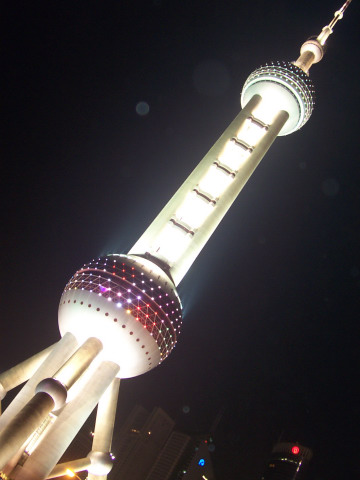 and finally the Bund.
and finally the Bund.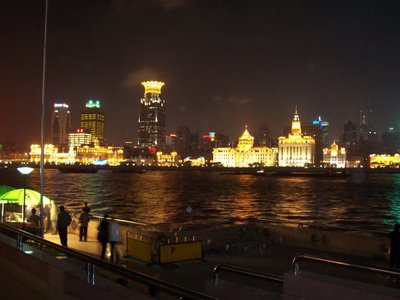
Shanghai is stunning and there's so much to see. I hardly saw anything of the city itself but really hope to go back there some time to explore in proper detail some of the amazing buidings, parks, restaurants and museums in this hugely cosmopolitan city.
-----
to be continued...
Posted by
Unknown
at
2:27 pm
2
comments
![]()
![]()
Wednesday, April 19, 2006
Part three of JMTA and as the days back in Beijing are already filling up I realise how much of a break I feel I've got from this long holiday.
----------------
...and so the circus continued with cliche after thoroughly enjoyable cliche. Early risers on the boat (myself included) had a half hour of top-deck taichi at 7.30 am which on a gently swaying boat is far from easy. The taichi master insisted on constantly changing his position relative to us so not only were we standing on one leg with our arms akimbo but much of the time was spent craning our necks to see what was going on behind us. Unfortunately no photos of me taiching but imagine a somewhat dozy looking, goateed, tall English chap wobbling precariously on the back of a boat and you have a pretty good idea. Here at least is a photo of the place we were performing. and an intriguing sign near the same point on the ship, I leave subtitles to your imagination.
and an intriguing sign near the same point on the ship, I leave subtitles to your imagination.
and fear not, though there are no pictures of me in taichi mode there is this illustration that I don't fit into such boats with the greatest of ease Leaving Chongqing is a lengthy affair as the municipality stretches 400km downstream. The first day's view consisted mostly of steep banks dotted with settlements, some old, some relocated above the final line to which the water will rise by 2009 and a proliferation of processing plants, power stations and factories belching out their fumes. Here's one of the bridges as you leave the city proper
Leaving Chongqing is a lengthy affair as the municipality stretches 400km downstream. The first day's view consisted mostly of steep banks dotted with settlements, some old, some relocated above the final line to which the water will rise by 2009 and a proliferation of processing plants, power stations and factories belching out their fumes. Here's one of the bridges as you leave the city proper and a factory on the otherwise idyllic banks
and a factory on the otherwise idyllic banks After some snaps on deck, a buffet lunch and some gentle meandering about the ship, we docked at Feng Du, the ghost city, the bulk of which has been moved from one side of the river to the higher banked opposite side. 100,000 relocated in this settlement alone. Our tour guide was relatively candid about her positive and negative views on the dam project though the overall impression may have been biased by the fact that she has been relocated to a substantially larger flat.
After some snaps on deck, a buffet lunch and some gentle meandering about the ship, we docked at Feng Du, the ghost city, the bulk of which has been moved from one side of the river to the higher banked opposite side. 100,000 relocated in this settlement alone. Our tour guide was relatively candid about her positive and negative views on the dam project though the overall impression may have been biased by the fact that she has been relocated to a substantially larger flat.
The temples of the ghost city remain and as you walk up the 500 or so steps you make your way through Buddhist and Taoist temples all related in some way or other to the afterlife. Mum drew an impressive crowd whenever she stopped to paint and here I managed to get a photo of the melee.
Mum drew an impressive crowd whenever she stopped to paint and here I managed to get a photo of the melee. Some of the statues in the ghost city are designed to encourage one to perhaps lead a better life, warning that certain crimes would not go unnoticed and each had it's own punishment, for instance
Some of the statues in the ghost city are designed to encourage one to perhaps lead a better life, warning that certain crimes would not go unnoticed and each had it's own punishment, for instance It's rather difficult to tell with the many sculptures and temples just how many are really there for reasons of religion and how many are there to please the tourists. Of course they're all said to be terribly old and highly important relics but I'm not convinced with some of them.
It's rather difficult to tell with the many sculptures and temples just how many are really there for reasons of religion and how many are there to please the tourists. Of course they're all said to be terribly old and highly important relics but I'm not convinced with some of them.
The number of steps leading up and down the ghost city were punishment enough for some and there were brief fears that a group had been left in the underworld.
I skipped the snuff-bottle painting demonstration for a much needed trip to the onboard gym to work off a few of the calories that had been adding up of late. Plus, I feel that my snuff bottle painting is already up to scratch.
After dinner a talent show staged by the crew managed to involve both of my parents showing their respective talents in musical chairs and maritime taichi. I was safely oblivious to these events until the next day as I had retired by this point to settle peacefully with a good book and a fine view of the sunset An even sharper start (6.30) was called for as we entered the first of the three gorges. With towering cliffs and a far higher abundance of vegetation than upstream they are stunning and again the steamy haze only added to their Oriental mystery. At various points coffins hang in caves in the cliffs placed on the shear slopes 2000 years ago by unknown methods (it's proposed that 2000 years ago, the water level may have been several hundred feet higher so they may have been put there by boat, I'm surprised that such a proposition isn't easily tested).
An even sharper start (6.30) was called for as we entered the first of the three gorges. With towering cliffs and a far higher abundance of vegetation than upstream they are stunning and again the steamy haze only added to their Oriental mystery. At various points coffins hang in caves in the cliffs placed on the shear slopes 2000 years ago by unknown methods (it's proposed that 2000 years ago, the water level may have been several hundred feet higher so they may have been put there by boat, I'm surprised that such a proposition isn't easily tested).
 Stunning and well worth the trip just to see them but they're not unlike the Fford's at Milford Sound in New Zealand. Unfortunately, though the haze makes them better for seeing in the flesh, the photos are somewhat diminished. It's also difficult to get a real sense of the scale of it, apart from the boat in the above picture which is a cruiser, presumably carrying a few hundred people onboard.
Stunning and well worth the trip just to see them but they're not unlike the Fford's at Milford Sound in New Zealand. Unfortunately, though the haze makes them better for seeing in the flesh, the photos are somewhat diminished. It's also difficult to get a real sense of the scale of it, apart from the boat in the above picture which is a cruiser, presumably carrying a few hundred people onboard.
An hour or so later and we went through the second gorge with similarly impressive scenery. With the colossal scale of them, even though the water has already risen by 80m in the gorges I'm not sure that they would have looked very different previously.

Excursion number two left around 10 as we transferred to a small ferry for one of the narrow tributaries.  More magnificent scenery was by no means growing tiresome as we docked at a small harbour to transfer to sampans, traditional boats used by farmers for centuries with some of the strongest men I've ever seen maneuvering one of the most inefficient forms of transport I've ever witnessed (the slim paddles may however have been to ease the force of each stroke so that they can manage much longer distances).
More magnificent scenery was by no means growing tiresome as we docked at a small harbour to transfer to sampans, traditional boats used by farmers for centuries with some of the strongest men I've ever seen maneuvering one of the most inefficient forms of transport I've ever witnessed (the slim paddles may however have been to ease the force of each stroke so that they can manage much longer distances).
After much practice, one of the rowers managed to get the physics beard stroke to look pretty convincing


 They sang traditional songs and seemed all very happy to be taking a bunch of ignorant tourists up river to marvel at the ethnicity of it all. Genuinely good fun and a real chance to see some of the somewhat 'unadulterated' traditional way of life. As we got to the rapids, the rowers jumped ship and pulled the boat from the river bank, calf muscles straining at the bit. An hour or so of this didn't appear to raise a sweat as we returned to the ferry and then the main boat to continue the voyage. Another pounding on the running machine as the Yangtze scrolled past the window justified the creme caramel for dinner.
They sang traditional songs and seemed all very happy to be taking a bunch of ignorant tourists up river to marvel at the ethnicity of it all. Genuinely good fun and a real chance to see some of the somewhat 'unadulterated' traditional way of life. As we got to the rapids, the rowers jumped ship and pulled the boat from the river bank, calf muscles straining at the bit. An hour or so of this didn't appear to raise a sweat as we returned to the ferry and then the main boat to continue the voyage. Another pounding on the running machine as the Yangtze scrolled past the window justified the creme caramel for dinner.
Another afternoon of chatting to passengers, steering clear of the overpriced massages and some more reading was polished off nicely with the emperor's banquet. They play it pretty safe on the boat giving only the most Westernised Chinese food which is tasty nonetheless and washed down with a glass of wine, something I drink little of in Beijing.
The evening also included us reaching the dam and passing through the 5 locks that drop 112 m from one side to the other over the course of almost three hours. An incredible feat of engineering in itself but being trapped in a box with six other large fuming ships soon became a little overwhelming so we retired to the confines of the lower decks once the light grew dim. -----------
-----------
With a few minutes to go before we disembark I have a little time to finish off the cruise exploits. Another 6.30 start this morning was needed to take a short bus ride to the dam project. From an observer platform towering over the site you get a sense of proportion but a certain lack of scale of the immensity of the project. The 20GW of power are generated by 26 40m turbines produce 10% of China's energy supply. It's such a huge project with so many pros and cons that without all the information I think it's impossible to come to a reasonable conclusion on the overall balance of the construction.
Unfortunately photos which really capture the scale of it are not easy to get from the observation tower but I got a couple of snaps, first of the immense lock system and then of the dam itself. When completed I would guess that actually standing on it would give you a bit more of a sense of scale.
and then of the dam itself. When completed I would guess that actually standing on it would give you a bit more of a sense of scale. ------------
------------
More to follow tomorrow...
Posted by
Unknown
at
12:37 pm
4
comments
![]()
![]()